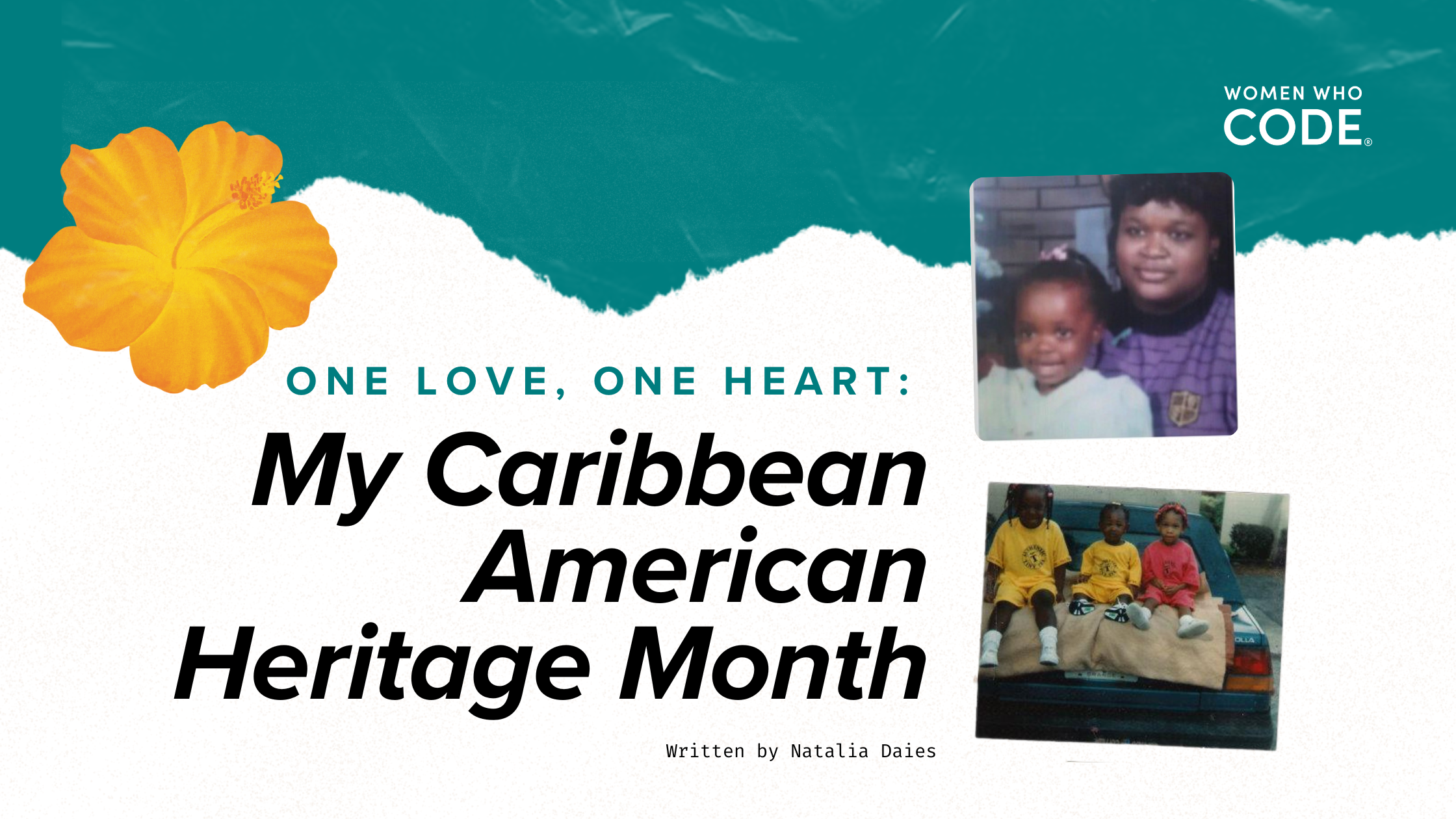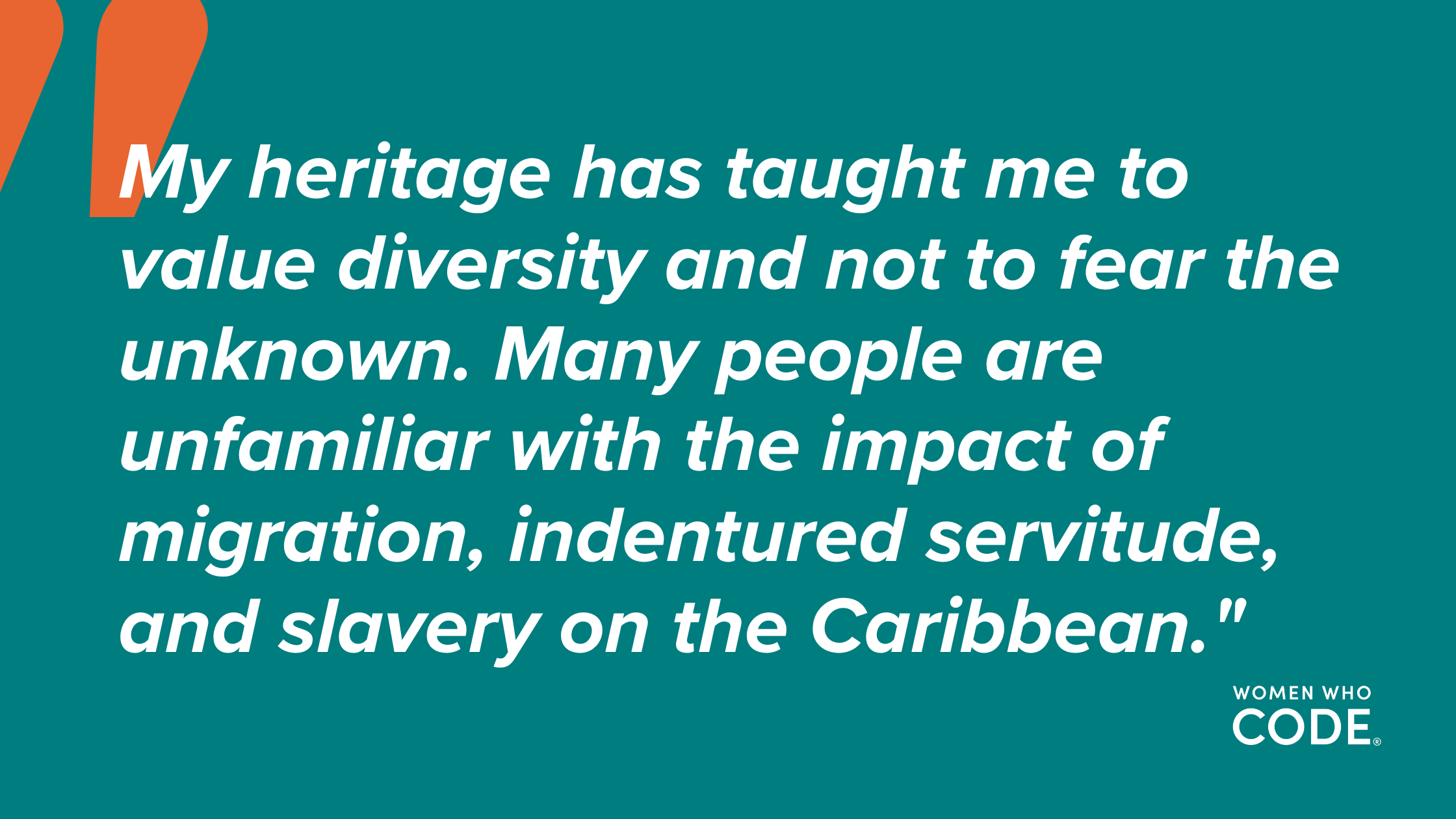One Love, One Heart: My Caribbean American Heritage Month
Written by Natalia Daies

Natalia Daies, Senior Director of Communications and Marketing at Women Who Code, shares about her Jamaican heritage, what it means to her, and the role it has played in who she is today.
Tell us a bit about your Caribbean background and how where you grew up impacted you.
When I was in elementary school my grandmother had these VHS tapes of music videos lined up under her television. One of them was Bob Marley‘s Waiting in Vain. I would sit at the foot of her bed and watch that tape over and over again. I was kind of in love with Bob Marley – I think it was the locs.
My family is West Indian from Kingston, Jamaica. I think people have a very specific perception of what being Jamaican is – Rastafari, reggae, and patois. I was raised by strong, resilient, very determined women, and stubborn men. Growing up a second-generation immigrant is a very interesting experience. For me, it was like navigating two different worlds. There’s this duality that happens when you are Black and Caribbean in America and it’s mostly evident in familial dynamics and the general framework that you’re raised within. Jamaicans are deeply religious and even more proud, fiercely loyal and protective. We are artists and storytellers. I grew up at Carnival, eating ackee and saltfish, watching my uncle break coconut at the dining room table for rice, drinking peppermint and bush tea when my stomach hurt, and dancing to Bob Marley, Buju Banton, Marcia Griffiths, and Dennis Brown.
The saying “it takes a village” describes my childhood perfectly. When I was a child, my family came to live in the same apartment complex in Southeast Texas. I could stand on my front porch and yell for my grandmother or aunties and they would peek their heads over the railing from upstairs.
My parents and grandparents value hard work, achievement, and family. Entrepreneurship is seen as the ideal way to create wealth in Jamaica, and that mindset is passed down to every generation. We are made up of phlebotomy school and boutique owners, small jewelry and record stores, caterers and caretakers, locticians, and musicians. Small business has been the ideal way of life for my family. When my cousin and I graduated in the same weekend from graduate school and were the first in our family to do so it was a big win for all of us but especially our parents and grandparents who have spent their lives seeing the value of higher education but not having the opportunity to attend themselves. My family has taught me what it means to keep going, to endure hardship, and to continue to strive, to find laughter where silence and grief have been the norm.
How has your Caribbean heritage influenced you throughout your life?
My heritage has taught me to value diversity and not to fear the unknown. Many people are unfamiliar with the impact of migration, indentured servitude, and slavery on the Caribbean. After slavery was abolished in Jamaica in 1834 people continued to arrive from countries like India, China, and the Middle East to work, trade, and settle. Our culture is rich with influences from around the world and yet grounded in cultural rituals of indigenous Jamaicans – manifest as its own beautifully distinct people. Jamaica’s national motto is “Out of Many, One People.” This means though we are different, we are one country. There is nothing more valuable and influential than brave inclusion.

How has it influenced your current work?
Jamaicans truly believe in closeness and unity. This idea of an innate connection to one another despite differences keeps me grounded. Leading on communications and marketing is not just about telling the right story to the right audience. It is elevating the WWCode mission in a way that empowers the global community to continue to work towards a more inclusive, accessible, and cooperative tech industry and world. With 343,000 members in 147 countries, keeping inclusion and equity at the forefront is vital to creating the change we’re working for. Whether it be eliminating the gender wage gap, breaking through barriers to access, or amplifying the wins of underrepresented individuals, my Jamaican heritage has taught me that the only way we'll get there is together.
What does National Caribbean American Heritage Month mean to you?
National Caribbean American Heritage Month means visibility. It means people will continue to be educated on Caribbean heritage and contributions beyond our music and food. Jamaicans have influenced global movements for civil rights and peace, introduced new spiritual perspectives, and inspired athletes, filmmakers, and musicians at every level. I am grateful to be the descendant of such loving, welcoming, and accomplished people.
Is there anything else you would like to share?
In the song “Waiting in Vain” Bob Marley sings, “Ya see, in life I know there’s lots of grief but your love is my relief.” This song is about the longing for romantic love, but when I hear these lyrics, I hear it highlighting the healing power of being seen. It resonates with me as a Black, queer woman and mother. I continue to hope and advocate for a better world. I am hopeful that every day that we do this work, more underrepresented individuals and communities will get to know relief from the grief and sorrow that comes with feeling unseen and unheard.